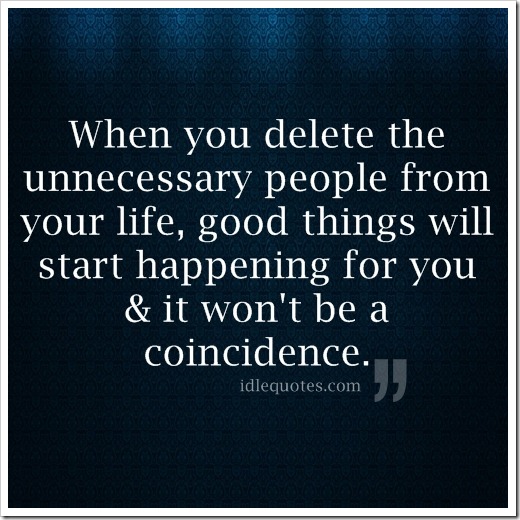Deciding to delete people from your life can be one of the most challenging yet liberating choices you can make. It’s about prioritizing your well-being and setting boundaries that protect your mental and emotional health. In a world where relationships shape who we are, knowing when to let go is crucial for personal growth and happiness.
Every relationship in our lives plays a role, whether positive or negative. However, there comes a time when certain individuals may no longer serve our highest good. The concept of deleting people from your life isn’t about being cruel or dismissive; it’s about recognizing toxic dynamics and making conscious decisions to improve your quality of life.
This article will explore the reasons why deleting people from your life might be necessary, how to identify toxic relationships, and practical steps to move forward. By the end, you'll have a clearer understanding of how to make this difficult decision and what it means for your long-term happiness and well-being.
Read also:Charles Mesure Height Unveiling The Truth Behind The Numbers
Table of Contents
- Understanding Toxic Relationships
- Signs You Need to Delete Someone from Your Life
- The Emotional Impact of Toxic People
- Setting Boundaries: A First Step
- How to Delete People Gracefully
- Mental Health Benefits of Letting Go
- Handling Guilt and Fear
- Practical Steps to Move Forward
- Rebuilding Your Social Circle
- Long-Term Personal Growth
Understanding Toxic Relationships
Toxic relationships come in many forms and can affect different aspects of your life. Whether it’s a friend, family member, or partner, these relationships often drain your energy and leave you feeling drained and unfulfilled. Understanding the nature of toxicity is the first step toward identifying whether someone needs to be deleted from your life.
What Makes a Relationship Toxic?
A toxic relationship is characterized by patterns of behavior that harm one or both parties involved. These behaviors may include manipulation, disrespect, dishonesty, or emotional abuse. Such relationships often lack mutual trust, respect, and support, which are essential components of a healthy connection.
Common Characteristics of Toxic People
- Constant criticism or belittling
- Refusal to take responsibility for their actions
- Lack of empathy or understanding
- Controlling or manipulative behavior
- Emotional or verbal abuse
By recognizing these traits, you can begin to evaluate whether certain individuals in your life are contributing positively or negatively to your overall well-being.
Signs You Need to Delete Someone from Your Life
Knowing when to delete someone from your life isn’t always easy. However, there are clear signs that indicate a relationship may no longer be beneficial. Pay attention to how you feel around certain people and consider whether their presence adds value to your life or diminishes it.
Emotional Exhaustion
If you find yourself constantly drained after spending time with someone, it could be a sign that the relationship is toxic. Healthy relationships should leave you feeling energized and supported, not depleted and stressed.
Unresolved Conflicts
Constant arguments or unresolved issues can create tension and resentment. If attempts to resolve conflicts are met with resistance or hostility, it may be time to reassess the relationship.
Read also:Cristine Reyes Boyfriend Unveiling Her Love Life And Journey
Loss of Self-Worth
When someone consistently undermines your confidence or makes you doubt your abilities, it’s important to address the situation. No one deserves to feel less than they are because of another person.
The Emotional Impact of Toxic People
Being around toxic individuals can have a profound impact on your emotional well-being. Over time, their negative influence can lead to anxiety, depression, and decreased self-esteem. Understanding the emotional toll of these relationships can help motivate you to make necessary changes.
How Toxic People Affect Your Mental Health
Studies have shown that prolonged exposure to toxic relationships can increase levels of stress hormones like cortisol, which can negatively affect both physical and mental health. Chronic stress is linked to various health issues, including heart disease, insomnia, and weakened immune function.
Setting Boundaries: A First Step
Before deleting someone entirely, consider setting boundaries as an initial step. Boundaries help protect your emotional and mental health while giving the other person an opportunity to change their behavior.
Types of Boundaries
- Physical boundaries: Limiting physical contact or proximity
- Emotional boundaries: Protecting your feelings by limiting emotional involvement
- Time boundaries: Restricting the amount of time spent with the person
Communicating your boundaries clearly and respectfully is key to maintaining healthy relationships. If the other person refuses to respect your limits, it may be time to reconsider the relationship altogether.
How to Delete People Gracefully
Deleting someone from your life doesn’t have to be confrontational or dramatic. With tact and consideration, you can end relationships in a way that honors both parties.
Steps to Deleting Someone Gracefully
- Reflect on your reasons for wanting to delete the person
- Communicate your decision honestly and respectfully
- Be prepared for potential reactions and remain firm in your decision
- Limit contact moving forward to avoid unnecessary conflict
Remember, deleting someone from your life is not a reflection of their worth but rather a choice you’re making for your own well-being.
Mental Health Benefits of Letting Go
Letting go of toxic relationships can have significant mental health benefits. By removing negativity from your life, you create space for positivity, growth, and healing.
Improved Self-Esteem
Without the constant criticism or belittling from toxic individuals, you can begin to rebuild your confidence and self-worth. This newfound self-assurance can lead to greater success in both personal and professional aspects of your life.
Reduced Stress and Anxiety
Eliminating sources of stress and anxiety can improve your overall mental health. You may notice improved sleep, increased energy levels, and a more positive outlook on life.
Handling Guilt and Fear
It’s natural to experience feelings of guilt or fear when deleting someone from your life. However, it’s important to recognize that these emotions are temporary and that your decision is ultimately for your own good.
Addressing Guilt
Guilt often stems from societal expectations or fears of hurting others. Remind yourself that setting boundaries and prioritizing your well-being is not selfish but necessary for a healthy life.
Overcoming Fear
Fear of loneliness or retaliation can hold you back from making necessary changes. Focus on the positive outcomes of your decision and surround yourself with supportive individuals who uplift and inspire you.
Practical Steps to Move Forward
Moving forward after deleting someone from your life requires intention and effort. Here are some practical steps to help you transition smoothly:
Focus on Self-Care
Prioritize activities that nourish your body and mind, such as exercise, meditation, or pursuing hobbies you enjoy. Taking care of yourself will help you heal and grow stronger.
Seek Support
Reach out to trusted friends or family members for support during this transition. Professional counseling can also provide valuable guidance and tools for processing your emotions.
Set New Goals
Use this time as an opportunity to set new goals and pursue passions you may have neglected. This can help redirect your focus toward positive aspects of your life.
Rebuilding Your Social Circle
After deleting someone from your life, you may find yourself with more time and energy to invest in meaningful relationships. Rebuilding your social circle with positive, supportive individuals can enhance your quality of life.
How to Find Positive Relationships
- Join clubs or groups aligned with your interests
- Volunteer for causes you care about
- Attend networking events or workshops
Surrounding yourself with like-minded individuals can foster a sense of community and belonging, helping you heal and grow.
Long-Term Personal Growth
Deleting people from your life can lead to significant personal growth over time. By focusing on self-improvement and surrounding yourself with positive influences, you can transform your life in meaningful ways.
Embracing Change
Change is inevitable, and learning to embrace it can lead to personal transformation. Use this opportunity to reflect on your values, goals, and aspirations, and make choices that align with your true self.
Developing Resilience
Overcoming challenges and making difficult decisions strengthens your resilience. As you navigate through life’s ups and downs, you’ll become more confident in your ability to handle whatever comes your way.
Conclusion
Deleting people from your life is a courageous step toward improving your well-being and achieving personal growth. By recognizing toxic relationships, setting boundaries, and making conscious choices, you can create a life filled with positivity and fulfillment.
We encourage you to reflect on the insights shared in this article and take action toward a healthier, happier future. Share your thoughts in the comments below or explore other articles on our site for further guidance and inspiration. Remember, your well-being is worth prioritizing, and you deserve to surround yourself with people who uplift and support you.


